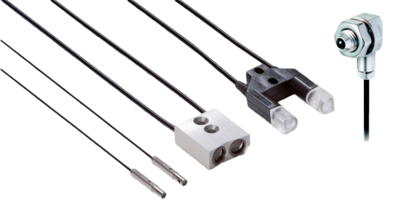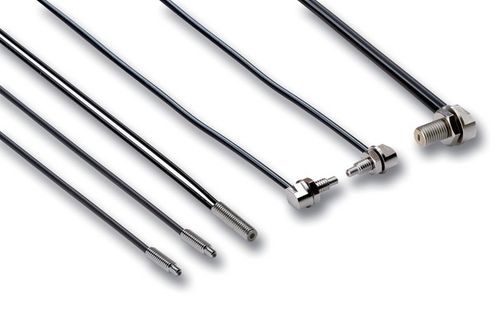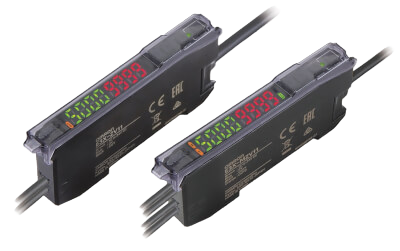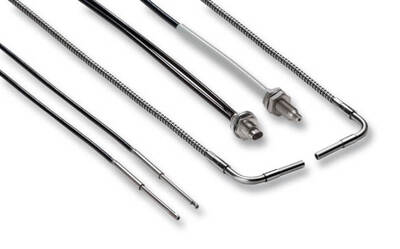Omron Fiber optic sensors
omron e32
- Response time: 0.1 ms (typical)
- Switching frequency: up to 2 kHz
- Body material: stainless steel, brass, PEEK
- Cable type: PVC, polyurethane
art. E32A0003H
E32 Precision Detection
art. E32A0006B
E32 Square Shape
art. E32A0042R
e32 a04 2m
E32 Precision Detection
art. E32A0037B
e32 a12 2m
E32 Precision Detection
art. E32 1533B
e32 c11n 2m
E32 Precision Detection
art. E32 1598G
e32 c21n 2m
E32 Precision Detection
art. E32 1535R
e32 c31n 2m
E32 Precision Detection
art. E32 0016E
e32 c91n 2m
E32 Special
art. E32 1513H
e32 d11n 2m
E32 Standard Cylindrical
art. E32 1458A
e32 d11r 2m
E32 Standard Cylindrical
e32 d15yr 2m
art. E32 1541C
E32 Square Shape
e32 d15zr 2m
art. E32 1542A
E32 Square Shape
omron e3x
- Body material: ABS plastic
- Installation: DIN rail, panel
- Certificates: CE, UL, CSA
e3x ect
art. E3X 7307A
e3x hd0
art. E3X 1532B
e3x hd11 2m
art. E3X 1544F
omron fiber sensor
- Response time: from 0.05 ms to 1 ms (depending on the sensor model).
- Operating temperature: from -40°C to +70°C (depending on the sensor model).
- Housing material: stainless steel, brass, plastic (depending on the sensor model).
art. E32 1601M
E32 Standard Cylindrical
art. E32 1459M
E32 Standard Cylindrical
art. E32 1303H
E32 Robot
art. E32 1548M
E32 Miniature
art. E32 1553G
E32 Area Monitoring
art. E32 1590A
E32 Special
art. E32 2014M
E32 Special
art. E32 2170G
E32 Special
art. E32 9417H
E32 Area Monitoring
art. E32 1450F
E32 Special
art. E32 1560M
E32 Precision Detection
art. E32 1561H
E32 Precision Detection
Omron is a well-known name in the industrial automation industry, with a reputation for innovative products that meet the high demands of modern manufacturing and process control. The company's fiber optic sensors product line is designed to offer unparalleled precision and reliability in various applications.
Fiber optic sensors detect changes in position, temperature, or pressure in the environment by using light that is conveyed by optical fibers.These sensors consist of a light source, optic cable, and a detector that identifies changes in the light signal. What makes them valuable in industrial automation is their high sensitivity, flexibility, and immunity to electromagnetic interference.
Types of Omron fiber optic sensors
For a multitude of uses, Omron provides a broad selection of fiber optic sensors. Sensors can be classified into several categories.
1. Type of detection
- Reflected Beam Sensors: Sensors detect objects by reflecting light off them.
- Direct Beam Sensors: These sensors detect objects by interrupting a beam of light.
- Scattered Beam Sensors: These sensors detect objects that scatter light.
- Distance sensors: Sensors measure the distance to an object.
2. Fiber type
- Single-mode sensors: These sensors use a single fiber to transmit light.
- Multimode sensors: Sensors use multiple fibers to transmit light.
3. Fiber diameter
- Thick fiber sensor: Sensors use fiber with a diameter of 200 µm or larger.
- Fine fiber sensors: These sensors use fiber with a diameter of 50 µm or less.
4. Body type
- Sensors in a cylindrical body: Sensors have a cylindrical shape.
- Sensors in a rectangular body: These sensors have a rectangular shape.
- Sensors in a miniature body: These sensors have a very small size.
5. Additional characteristics
- Sensors with a reinforced housing: These sensors are resistant to shocks and vibrations.
- Explosion-Proof Sensors: The use of these sensors in potentially explosive environments is approved.
- IP-Rated Sensors: These sensors are IP-rated, indicating their resistance to dust and water.
Benefits of Using Omron Fiber Optic Sensors
Fiber optic sensors have transformed industrial automation with their advanced technology and versatility. When it comes to choosing the best sensors for your applications, Omron stands out as a leading provider with a wide range of reliable and innovative products.
High Sensitivity and Accuracy
Because of their exceptional sensitivity, omron optical fiber sensor are renowned for their ability to pick up even the smallest variations in light location or intensity. This accuracy is crucial in industrial automation, where precision is a top priority. Whether it's monitoring product quality on a manufacturing line or ensuring precise positioning in an assembly process, Omron sensors deliver consistent and accurate results.
Immunity to Electromagnetic Interference (EMI)
The resilience of fiber optic technology to electromagnetic interference is one of its main advantages. This makes Omron fiber optic sensors ideal for industrial environments with heavy machinery and electrical equipment. The absence of EMI means you can deploy these sensors without worrying about signal disruptions or false readings, ensuring reliable performance even in challenging conditions.
Versatility and Flexibility
Omron fiber optic sensors come in a variety of models and configurations, making them versatile for different applications. Omron offers a solution that meets your needs, whether you need fiber optic amplifiers, through-beam sensors, or reflecting sensors. This versatility allows you to use Omron sensors across various industries, from automotive to pharmaceuticals, without compromising performance or adaptability.
Compact and Lightweight Design
The compact and lightweight design of Omron fiber optic sensors makes them easy to install in tight spaces and integrate into existing systems. This is especially beneficial for industries with limited installation space or complex setups. The smaller footprint doesn't compromise performance, as Omron's sensors maintain high sensitivity and durability.
Robust and Durable
Strong industrial settings are not a problem for optic sensor. They are resistant to extreme temperatures, vibrations, and chemicals, ensuring a long lifespan even under challenging conditions. This durability reduces maintenance costs and minimizes downtime, providing a reliable solution for continuous operation.
Easy Installation and Maintenance
Omron provides comprehensive installation guidelines for their fiber optic sensors, making it easy for users to set them up correctly. Additionally, the sensors require minimal maintenance, with simple cleaning and occasional inspections ensuring optimal performance. This ease of maintenance reduces the total cost of ownership and ensures smooth operation over time.
Wide Range of Applications
Numerous applications can benefit from the use of Omron fiber optic sensors. In industrial automation, they are used for part detection, position sensing, and quality control. In medical equipment, they are employed for precision monitoring in devices like medical imaging systems and surgical tools. The flexibility of Omron's product line means you can find a sensor for almost any application.
Popular models of Omron fiber optic sensors
Omron fiber optic sensors are becoming a necessary tool in many different sectors because of their high accuracy, responsiveness, environmental resistance, and flexibility.
Omron E3Z
- This thick fiber (200 µm) reflected beam sensor is one of Omron's most popular sensors.
- It offers a wide range of features, including compact size, high sensitivity, shock and vibration resistance, and an affordable price.
- Applications for the E3Z sensor are numerous and include conveyor line monitoring, liquid level monitoring, and component detection.
Omron E3S
- This thick fiber direct beam sensor (200 µm) is another popular choice for many applications.
- It offers high detection accuracy, environmental resistance, and a wide operating temperature range.
- The E3S sensor is suitable for applications such as small part detection, quality control, and defect detection.
Omron E3AS
- This diffuse beam sensor with a thick fiber (200 µm) is designed to detect complex objects such as transparent or uneven surfaces.
- It offers high fault tolerance and a wide operating temperature range.
- The E3AS sensor is suitable for applications such as stain detection, crack detection, and package inspection.
Omron E3C
- This thick fiber (200 µm) distance sensor is used to accurately measure the distance to an object.
- It offers high measurement accuracy, wide measurement range, and environmental resistance.
- The E3C sensor is suitable for applications such as size control, position control, and presence detection.
Omron E3FA
- This thin fiber (50 µm) reflected beam sensor offers high sensitivity and a compact size.
- It is suitable for detecting small details and complex objects in a limited space.
- The E3FA sensor is used in applications such as PCB detection, print inspection, and medical device detection.
Omron E3JK
- This thin fiber direct beam sensor (50 µm) offers high detection accuracy and environmental resistance.
- It is suitable for detecting small details and complex objects in harsh conditions.
- The E3JK sensor is used in applications such as electronic component detection, quality control, and defect detection.
Omron E3JM
- This thin fiber (50 µm) diffuse beam sensor is designed to detect complex objects, such as transparent or uneven surfaces, in a confined space.
- It offers high fault tolerance and a wide operating temperature range.
- The E3JM sensor is used in applications such as stain detection, crack detection, and package inspection.
Omron E3T
- This thin fiber (50 µm) distance sensor is used to accurately measure the distance to an object in a confined space.
- It offers high measurement accuracy, a wide measurement range, and environmental resistance.
- The E3T sensor is used in applications such as size control, position control, and presence detection.
Omron Fiber Optic Sensors are a great option for a variety of industrial applications because of their accuracy, adaptability, and durability.
If you have questions about choosing the right sensor or understanding specific characteristics, Eltra Trade managers are always ready to assist. With expert guidance, you can confidently select the best solution for your needs.



